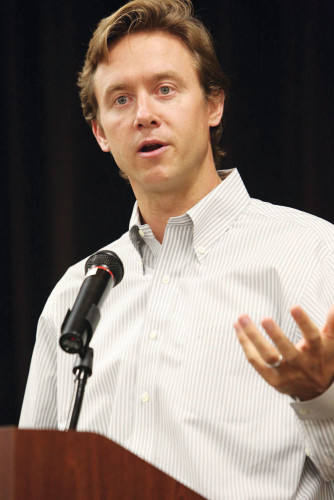In a remarkable coincidence, two long-awaited educational events occurred the same week in December: release of the PARCC test results for Colorado students and congressional passage of ESSA, a new federal education bill that has the potential to undo PARCC. So what is the future of PARCC?
Even as PARCC was being developed, critics complained of the burden and expense of testing, and what is viewed by some as unwarranted meddling in the local control of education. Steve Durham, chair of the State Board of Education, was recently quoted in Chalkbeat, an online education publication as saying, “The odds of continuing with that particular assessment are slim beyond next year. But I have only one vote.” In December, that publication also reported that the newly appointed State Commissioner of Education Richard Crandall has “signaled an openness to move Colorado away from the Common Core and its membership in PARCC, the multistate testing effort.”

State Sen. Mike Johnston
However, State Sen. Mike Johnston, who has been a prime mover of educational reforms in the Colorado Legislature, explained that state law regarding education is complicated due to Colorado’s unusual educational governance structure. An independently elected state board and the state commissioner of education, who it appoints, are in the position of having to implement educational policies set by the Legislature and governor. Because of that structure, and because of House Bill 1240, passed in 2012, that requires Colorado to participate in PARCC, Johnston said, “I don’t think there are any significant shifts coming for Colorado as a result of that legislation.”
The Front Porch’s request for comment from the Colorado Department of Education yielded this response: “Colorado will be administering the PARCC exams in spring 2016. We are looking into the possibility of an assessment pilot project in which we would look at other ways of assessing students over the next few years. The ESSA opens the door to these types of pilot projects.”
ESSA, the Every Student Succeeds Act, supersedes the No Child Left Behind Act that dates to 2001 and was a hallmark of the Bush presidency. Signed by President Obama in December, ESSA retains features such as the testing requirement and calendar but will allow, over time, more flexibility at the state level on matters such as how schools and districts are evaluated.
By contrast, Johnston said, “What we’re hearing overwhelmingly from principals, superintendents and teachers is stand back, let us do our work, stand down, don’t change it, don’t fix it, don’t revise it, don’t overhaul it, just give us the chance to implement it. Let us get some iterations of doing that with fidelity. As we get stronger, we’ll tell you if we need tweaks. But there is no reason to rebuild the plane before you’ve flown it.”
He noted that measures have already been taken to reduce the testing burden by 90 minutes for the 2015-2016 school year, bringing testing as a percentage of total instructional time below the 2 percent limit to almost 1 percent, and the PARCC test has been eliminated for 10th- and 11th-graders.
Johnston also cautioned that it would take years and millions of dollars to develop replacement tests that, in the end, would require “double testing” to have them validated against PARCC.




0 Comments